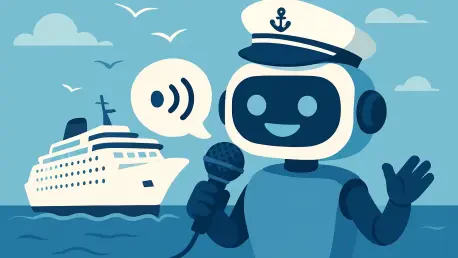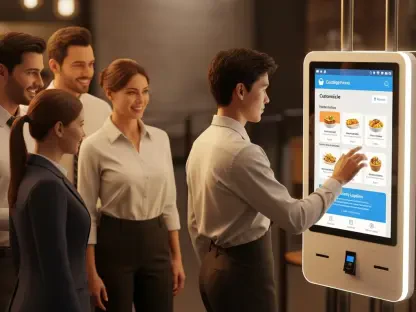In an era where digital innovation is reshaping every facet of the travel industry, a remarkable advancement has emerged from the cruise sector that promises to transform how passengers interact with onboard services. Imagine stepping onto a luxury cruise liner, where instead of fumbling through apps or waiting in line for assistance, a simple voice command can handle everything from booking a spa session to reserving a table for dinner. This seamless interaction is no longer a distant dream but a reality, thanks to a pioneering technology introduced by a leading cruise management platform. The integration of voice-enabled artificial intelligence into guest services is setting a new standard for convenience and personalization, captivating travelers who crave effortless experiences. This development not only enhances the journey for passengers but also streamlines operations for cruise operators, marking a significant leap forward in hospitality technology.
Transforming Digital Interactions in Cruise Travel
Elevating Guest Engagement Through Voice Technology
The introduction of voice-activated AI within a comprehensive cruise management platform has redefined the ease with which passengers access services. This cutting-edge system allows guests to use natural speech to make inquiries, book activities, or retrieve information about their journey, eliminating the need for manual input or navigation through complex digital interfaces. Whether planning pre-cruise excursions or managing onboard preferences, the technology ensures a hands-free, intuitive experience that caters to modern expectations of efficiency. Available across multiple devices, it maintains consistency in interaction, whether a guest is using a smartphone before boarding or an in-cabin TV during the voyage. This shift toward voice-based solutions highlights a broader trend in travel, where accessibility and user-friendliness are paramount, ensuring that even less tech-savvy passengers can engage with services effortlessly.
Beyond mere convenience, this voice technology fosters a deeper connection between guests and the cruise experience by prioritizing responsiveness. The AI leverages a cruise-specific knowledge base to provide real-time, accurate answers to a wide array of questions, from dining options to daily schedules. Unlike static systems that rely on outdated information, this dynamic integration ensures that responses are always relevant to the current context of the journey. Such precision not only saves time but also builds trust, as passengers feel their needs are understood and addressed promptly. This capability extends to multilingual support, breaking down language barriers and making the cruise experience more inclusive for a global clientele. The result is a heightened sense of engagement, where technology acts as a bridge to a more personalized and satisfying travel adventure.
Streamlining Operations with Seamless Integration
One of the standout aspects of this AI-driven voice system is its ability to enhance operational efficiency for cruise lines. By automating routine tasks such as bookings and inquiries, the technology reduces the workload on staff, allowing them to focus on delivering exceptional in-person service. Real-time data updates ensure that all information shared with guests reflects the latest availability, whether it’s for a shore excursion or a wellness appointment. This minimizes errors and miscommunications, creating a smoother workflow behind the scenes. Additionally, the system’s integration with onboard amenities like in-cabin TVs means guests can access services directly from their rooms, further reducing congestion at service desks and enhancing overall operational flow.
Another critical benefit lies in the system’s capacity for voice-activated purchasing, which simplifies transactions for both guests and operators. Passengers can effortlessly reserve services or make purchases using spoken commands, streamlining the process of securing onboard experiences. This feature not only boosts revenue opportunities for cruise lines by making impulse purchases easier but also enhances guest satisfaction through its simplicity. The technology’s design prioritizes security and ease, ensuring that transactions are both safe and swift. By aligning with consumer preferences for quick, contactless interactions, this innovation positions cruise operators to meet evolving demands while maintaining a competitive edge in a rapidly digitizing industry.
Setting New Standards for Personalized Travel
Crafting Tailored Experiences with AI Precision
At the heart of this technological advancement is a commitment to personalization that sets it apart from traditional guest service models. The AI system analyzes real-time data to offer recommendations that align with individual preferences, whether suggesting a specific dining venue or an activity based on past choices. This level of customization transforms a standard cruise into a uniquely curated journey, where each guest feels their needs are anticipated and met. Natural language processing enables the chatbot to interpret varied speech patterns and respond with clarity, ensuring that interactions feel human and intuitive. Such tailored engagement not only elevates satisfaction but also encourages guests to explore more of what the cruise has to offer.
The impact of personalization extends beyond mere recommendations to create a cohesive travel experience from start to finish. Guests can use the voice system during pre-cruise planning to set preferences and make bookings, ensuring that their journey begins on a personalized note. Once onboard, the same technology continues to adapt, providing updates and suggestions that reflect the latest onboard happenings. This continuity across different stages of the trip eliminates the frustration of disjointed services, offering a seamless digital companion that evolves with the guest’s needs. By focusing on individualization, the technology redefines expectations, making every interaction a step toward a more memorable and enjoyable cruise experience.
Driving Industry-Wide Innovation and Expectations
This voice-enabled AI solution reflects a broader shift in the travel sector toward embracing digital transformation as a core component of service delivery. By addressing consumer demand for seamless, tech-driven interactions, the technology positions itself as a benchmark for what modern travelers expect from hospitality providers. Its success underscores the importance of user-centric design, where convenience and accessibility take precedence over outdated, manual processes. As cruise lines adopt such innovations, the ripple effect is likely to influence other areas of tourism, pushing competitors to explore similar advancements to stay relevant in a fast-evolving market.
Looking back, the deployment of this AI technology marked a turning point for operational excellence and guest satisfaction in the cruise industry. The focus on multilingual capabilities and real-time data integration demonstrated a clear understanding of diverse traveler needs. Reflecting on its impact, the next steps involved expanding these features to cover even more nuanced aspects of guest interaction, potentially integrating predictive analytics for anticipatory service. Exploring partnerships with other travel sectors to share insights could further refine this technology, ensuring it remains at the forefront of digital hospitality solutions. This legacy of innovation continues to inspire a future where technology and human experience converge seamlessly.









